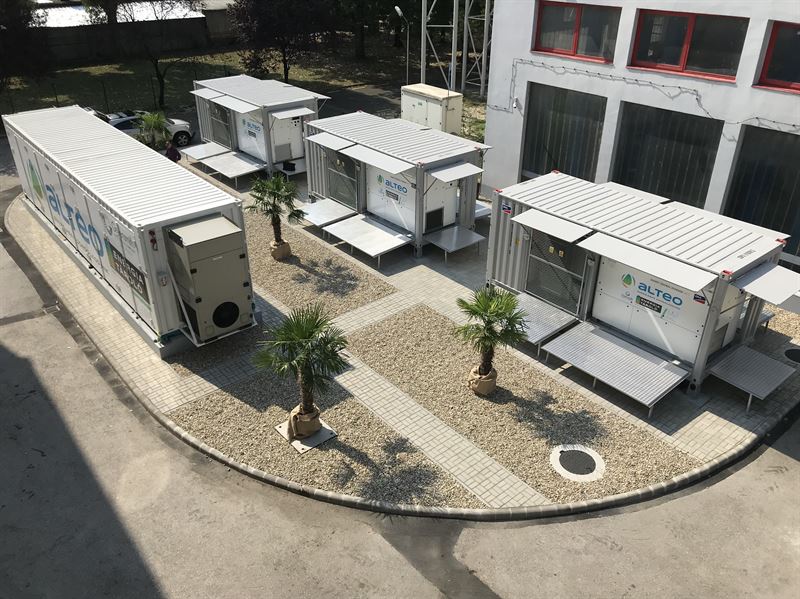Wärtsilä has completed its first global engine plus storage hybrid installation, and its first European EPC energy storage project, for Alteo Group subsidiary, Sinergy Kft, based in Budapest.
“The order was booked in Q1 2018 and the project was successfully commissioned on the 22nd of August 2018,” said Wärtsilä in a statement released today.
For the project, it integrated a 6 MW/4 MWh battery storage plant, complete with inverters and power electronics, with its GEMS energy management system, provided by subsidiary, Greensmith Energy, next to an existing power plant, which runs on three Wärtsilä W34SG engines. The system can analyze changes in market conditions and rate structures, said Wärtsilä.
A spokesperson for U.S.-based storage specialist, Greensmith, which Wärtsilä acquired back in July, told pv magazine the battery technology used is lithium ion. They could not disclose any project costs, however.
“The installation will enable Alteo to participate in the electricity market by providing frequency and secondary regulation to the national grid operating in virtual power plant mode,” continued the statement.
Wärtsilä’s solar + storage plans
In 2016, the Helsinki-based technology group announced it was entering the solar energy business, by offering utility-scale PV solutions. These include solar PV power plants of 10 MW and above, and hybrid power plants comprising solar PV plants and internal combustion engines, it said, adding that both solutions are offered with full EPC delivery. Wärtsilä’s first solar project is set to be built in Jordan.
In an interview with pv magazine this January, President of Wärtsilä Energy Solutions Javier Cavada outlined his vision for a solar + storage. “Our unique value proposition is to become a leading hybrid integrator, which means providing solar + storage, solar + gas, or gas + storage for example – all possible combinations, supported by total turnkey capability,” he said.
He added, “We are installing nine battery projects in the U.S., and we now have our first storage projects in Singapore, the U.K., and Australia. Everywhere we see a need for energy storage: It is not the main dish, but by combining flexible renewables with storage it is a way of making the grid and system better. This all means that today Wärtsilä is the biggest energy storage integrator globally.”
Wärtsilä says it is the first company to offer utility-scale solar hybrid plants. The hybrid solution couples a solar PV park with an ultra-flexible Wärtsilä Smart Power Generation power plant. The two units operate in synchronization to reduce the engines’ fuel consumption, it said.
Last March, it announced it would supply a 15 MW hybrid PV plant to Essakane Solar SAS in Burkina Faso. The solar farm is set to be built next to, and synchronized with, Wärtsilä´s 55 MW oil driven power plant, forming what it says will be the largest hybrid power plant in Africa, when complete.
At the time, Jukka-Pekka Niemi, General Manager for Marketing at Wärtsilä Energy Solutions, told pv magazine that operation of the 128,000 thin film panels, delivered by First Solar, was scheduled to begin in late 2017.
In November, it signed a contract to build a 75 MW (AC) PV power plant in Nigeria with Pan Africa Solar Ltd and, a month later, said it would supply EPC services to a 52 MW solar PV power plant in Jordan, owned by a joint venture between AES Jordan and Japanese conglomerate Mitsui & Co. Construction for the plant was scheduled to begin in June 2018, and it will begin commercial operation in July 2019.
Most recently, in June, it signed an agreement with automobile producer, Hyundai Motor Group to establish a commercial partnership for the use of second-life electric vehicle (EV) batteries in storage solutions.
This content is protected by copyright and may not be reused. If you want to cooperate with us and would like to reuse some of our content, please contact: editors@pv-magazine.com.




2 comments
By submitting this form you agree to pv magazine using your data for the purposes of publishing your comment.
Your personal data will only be disclosed or otherwise transmitted to third parties for the purposes of spam filtering or if this is necessary for technical maintenance of the website. Any other transfer to third parties will not take place unless this is justified on the basis of applicable data protection regulations or if pv magazine is legally obliged to do so.
You may revoke this consent at any time with effect for the future, in which case your personal data will be deleted immediately. Otherwise, your data will be deleted if pv magazine has processed your request or the purpose of data storage is fulfilled.
Further information on data privacy can be found in our Data Protection Policy.